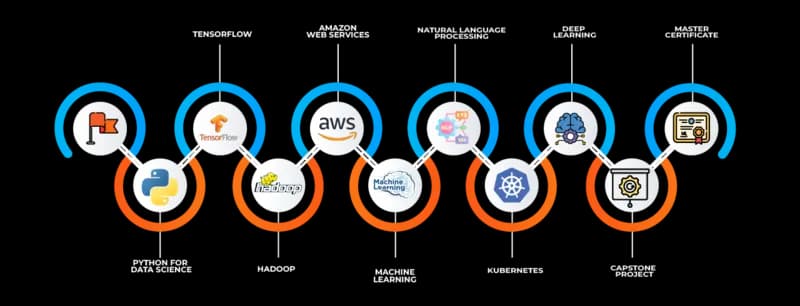Data Science with Python Course in Pune
 Data Science Course with Live Hands-On Projects Experience
Data Science Course with Live Hands-On Projects Experience Build a Strong Foundation in Data Science with Industry-Oriented Program.
Build a Strong Foundation in Data Science with Industry-Oriented Program. Master Data science with Gen AI Tools and Techniques from SevenMentor
Master Data science with Gen AI Tools and Techniques from SevenMentorStart Today!
CONSULT WITH
OUR ADVISORS
- Course & Curriculum Details
- Flexible Learning Options
- Affordable Learning
- Enrollment Process
- Career Guidance
- Internship Opportunities
- General Communication
- Certification Benefits
Learning Curve for Data Science with Python

Master In Data Science with Python Course
OneCourseMultipleRoles
Empower your career with in-demand data skills and open doors to top-tier opportunities.
Skills & Tools You'll Learn -
Why Choose SevenMentor Data Science with Python
Empowering Careers with Industry-Ready Skills.
Specialized Pocket Friendly Programs as per your requirements
Live Projects With Hands-on Experience
Corporate Soft-skills & Personality Building Sessions
Digital Online, Classroom, Hybrid Batches
Interview Calls Assistance & Mock Sessions
1:1 Mentorship when required
Industry Experienced Trainers
Class Recordings for Missed Classes
1 Year FREE Repeat Option
Bonus Resources
Specialized Pocket Friendly Programs as per your requirements
Live Projects With Hands-on Experience
Corporate Soft-skills & Personality Building Sessions
Digital Online, Classroom, Hybrid Batches
Interview Calls Assistance & Mock Sessions
1:1 Mentorship when required
Industry Experienced Trainers
Class Recordings for Missed Classes
1 Year FREE Repeat Option
Bonus Resources
Fastest 1:1 doubt support
Flexible EMI Plans
Adaptive LMS
Free Wifi Facilities
Flexible Scheduling
Ongoing Career Support
Placement Drives
GitHub Project Implementations
Real World Topics
5/5 rating for 99% doubt Solutions
Be Different With Master Certificate
Latest Market Technology & Practical Training
Resume Building Session & Job Portals Training
Enhanced Capstone Projects for learning
Stand Out with an impressive Certificate
Weekday and Weekend Batches
Workshops & Seminars with Industry Experts
Unlimited Interview Calls
AWS Cloud Project Deployments
Live Quizzes
Resolve doubts any time through chat, voice notes, calling or meeting with instructors.
Curriculum For Data Science with Python
BATCH SCHEDULE
Data Science with Python Course
Find Your Perfect Training Session
Feb 15 - Feb 21
3 sessionsFeb 22 - Feb 28
1 sessionsLearning Comes Alive Through Hands-On PROJECTS!
Comprehensive Training Programs Designed to Elevate Your Career
No active project selected.
Transform Your Future with Elite Certification
Add Our Training Certificate In Your LinkedIn Profile
Our industry-relevant certification equips you with essential skills required to succeed in a highly dynamic job market.
Join us and be part of over 50,000 successful certified graduates.

KEY Features that Makes Us Better and Best FIT For You
Expert Trainers
Industry professionals with extensive experience to guide your learning journey.
Comprehensive Curriculum
In-depth courses designed to meet current industry standards and trends.
Hands-on Training
Real-world projects and practical sessions to enhance learning outcomes.
Flexible Schedules
Options for weekday, weekend, and online batches to suit your convenience.
Industry-Recognized Certifications
Globally accepted credentials to boost your career prospects.
State-of-the-Art Infrastructure
Modern facilities and tools for an engaging learning experience.
100% Placement Assistance
Dedicated support to help you secure your dream job.
Affordable Fees
Quality training at competitive prices with flexible payment options.
Lifetime Access to Learning Materials
Revisit course content anytime for continuous learning.
Personalized Attention
Small batch sizes for individualized mentoring and guidance.
Diverse Course Offerings
A wide range of programs in IT, business, design, and more.
Course Content
Frequently Asked Questions
Everything you need to know about our revolutionary job platform
Why is Data Science important?
What is Data Science?
Why is Data Science essential for the future?
What skills are needed for Data Science?
Which Programming Languages Are Required for Data Science?
Why Is Python Popular in Data Science?
What is Data Cleaning and Transformation?
What is Database Optimization?
How to Ensure Data Integrity and Quality?
Why is Integration with Tools and Languages Important for Data Scientists?
What is Database Management and Storage in Data Science?
What Are the Key Tools for Database Management and Storage in Data Science?
How is Data Science Different from Data Analysis?
Best Institute for Data Science in Pune?
Is This Course Suitable for Beginners?
What Are the Prerequisites for Enrolling in a Data Science Course?
What Does the Curriculum of the Data Science Course Cover?
What Programming Tools & Languages Are Covered?
Who Can Benefit from a Data Science Course?
What Are the Job Prospects After Completing a Data Science Course?
Can I Enroll in This Course After Completing My Degree?
What Is the Expected Salary for a Fresher or Experienced Data Scientist in India?
Explore Other Demanding Courses
No demanding courses available at the moment.
Debug: courses prop type: object, isArray: yes, length: 0





